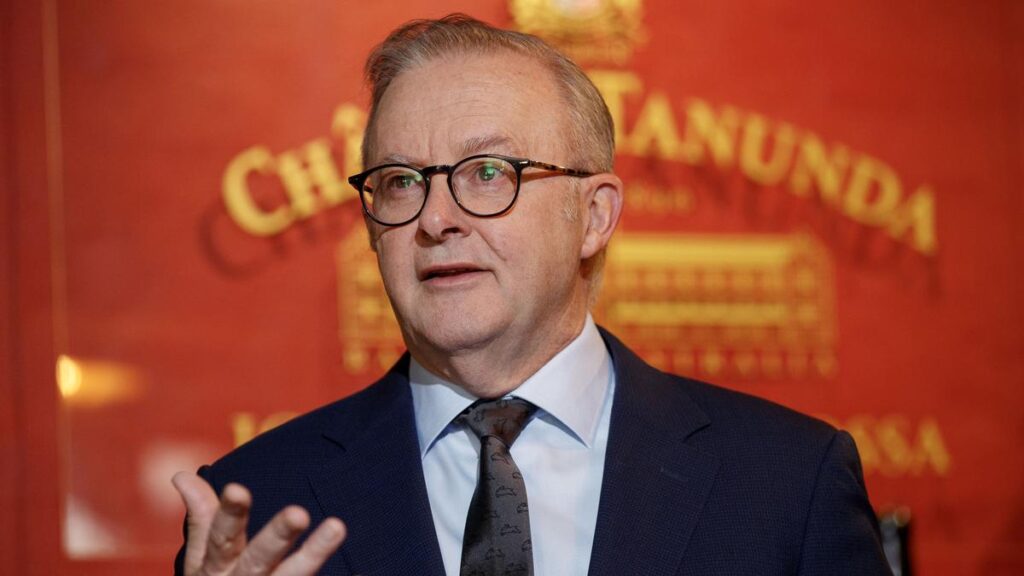
SYDNEY, AUSTRALIA - NewsWire Photos JULY 11, 2025: Prime Minister Anthony Albanese during a visit to Chateau Tanunda Sydney Cellar Door on Friday. Picture: NewsWire / Nikki Short
Prime Minister Anthony Albanese is spearheading a high-profile business delegation in Shanghai as he aims to fortify economic relations with China, Australia’s largest trading partner. On the second day of his six-day tour, Albanese is joined by prominent leaders from Australia’s mining sector, including Geraldine Slattery of BHP, Andrew Forrest of Fortescue, and Kellie Parker of Rio Tinto. Together, they will engage with key Chinese figures such as Xu Shishuai from the Ansteel Group and Wang Jiming, vice-president of the Baowu Group, at a roundtable focused on steel decarbonisation.
The Prime Minister kicked off his visit on October 22, 2023, highlighting the importance of sports and tourism ties. His schedule includes addressing both the roundtable discussion and a luncheon attended by around 200 senior business leaders from various sectors, including mining, manufacturing, and energy. During the luncheon at the Fairmont Peace Hotel, Albanese is expected to underscore Australia’s status as a “dependable trade partner” backed by a robust economy. He will discuss the impressive growth in business ties, which saw the exchange of goods and services reach $312 billion in 2022.
This trip is seen as a crucial step in rebuilding trade and political relations following a series of import bans on Australian commodities after the Morrison government called for an inquiry into the origins of COVID-19. The menu for Monday’s luncheon, featuring Australian red meat, rock lobster, and red wine, serves as a symbolic gesture toward improving relations as sanctions have recently been lifted. The removal of more than $20 billion in trade barriers is a significant milestone in this process.
In his address, Albanese will reference former Prime Minister Gough Whitlam, who celebrated his birthday at the Fairmont Peace Hotel in 1971 while fostering Australia’s relationship with China. “More than half a century on, it is a relationship that continues to evolve and grow,” Albanese is expected to say, emphasizing the maturity of this partnership in overcoming challenges and seizing opportunities.
A key focus of the discussions will be on enhancing cooperation in decarbonising both economies, aligning with Australia’s ambition to become a “renewable energy superpower.” Steel production is a significant contributor to global carbon emissions, and while China is the largest emitter, it is also investing heavily in clean technologies. Collaborative efforts between the two nations are deemed essential for achieving Australia’s green energy goals.
Albanese will highlight that Australia contributes approximately 60 percent of China’s iron ore imports for steel production and acknowledge that steelmaking accounts for 7 to 9 percent of global emissions. He will stress the importance of ensuring a sustainable global steel sector and addressing excess capacity through cooperative strategies.
“Steel decarbonisation presents a range of challenges,” Albanese will assert, calling for supportive policy environments, significant investments in research, and collaboration across academia, industry, and government.
Geraldine Slattery, President of BHP Australia, expressed optimism about the high-level business delegation, stating it reflects the potential for the Australian and Chinese resources sectors to contribute to the prosperity of both nations. BHP is committed to investing in technological advancements aimed at reducing emissions in steelmaking both in China and globally. This includes exploring various technologies such as low carbon fuel use, carbon capture, and electrolysis demonstrations.
This strategic visit underscores the ongoing efforts to enhance bilateral relations and tackle pressing global challenges through cooperative economic initiatives.






